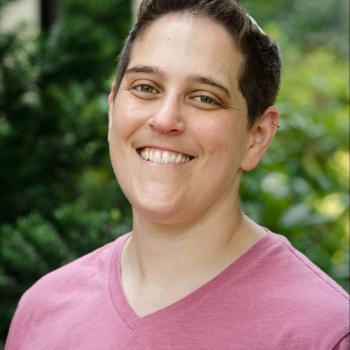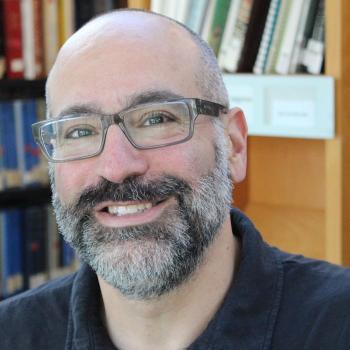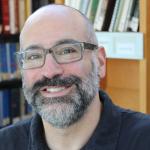By Rabbi Jessica Spencer, Hebrew College Rabbinical School `24
If you opened this week’s Torah portion looking for a comfort read, you might be disappointed. The death and destruction in the aftermath of Korach’s rebellion is made even more disquieting by our struggle to understand what was so wrong with the rebellion itself. Commentators over generations have wrestled with the text, pulling apart Korach’s words to find hidden meanings. Especially in times like these, with our hearts in the East, we might be tempted to skip over Korach in search of happier stories, clearer moral lessons. But perhaps it is especially in times like these that we need to read the story of Korach.
At the start of the parshah, Korach gathers well-respected men to stand against Moses and Aaron:
וַיִּקָּהֲלוּ עַל־מֹשֶׁה וְעַל־אַהֲרֹן וַיֹּאמְרוּ אֲלֵהֶם רַב־לָכֶם כִּי כָל־הָעֵדָה כֻּלָּם קְדֹשִׁים וּבְתוֹכָם יְהֹוָה וּמַדּוּעַ תִּתְנַשְּׂאוּ עַל־קְהַל יְהֹוָה׃
They gathered against Moses and Aaron and said to them, “You are too much! For all the community are holy, all of them, and in their midst is God. Why then do you raise yourselves above God’s congregation?” (Bamidbar 16:3)
On the face of it, Korach and his group are making an attractive egalitarian claim. The idea that “all the community is holy” is compelling—not so different, even, from the commandments that “you will be holy” (Vayikra 19:12), or Moses’ own that “you are a holy people” (Devarim 14:2). Yet God’s cataclysmic response makes it clear that we are not meant to be taken in by Korach’s words.
A multigenerational rabbinic conversation struggles to imagine what Korach might be saying and how Moses might reply. Rashi reads Korach as saying that everyone is holy, because all the community heard God speak at Sinai. This puzzles a later commentator, the Turkish fifteenth-century rabbi Eliyahu Mizrachi. Why doesn’t Rashi just base Korach’s argument on the verses in the Torah that say that “you will be holy”? Isn’t that a stronger argument? Why would he need to mention Sinai at all? In response, the seventeenth-century Polish rabbi Shabbetai Bass suggests a complicated counterfactual: if Korach had just said that everyone was holy, Moses could have responded that everyone is holy, but as prophets he and Aaron were at a higher level of holiness. If Korach instead reminded Moses of Sinai, where the entire Jewish people heard God, then Moses can make no higher claim. Moses is left speechless.
We might struggle to follow the twists and turns of this multigenerational dialogue, although as we do we notice more details about the text: that Moses does not argue back to Korach, that Korach’s claim is very close to the Torah’s own words. We might wonder what it means to be a holy people, or what sort of hierarchies are and are not defensible. The challenges in this rabbinic conversation reflect the challenges of reading parshat Korach itself. It is hard to make an argument against Korach’s claim that the whole community is holy. It is hard to want to make such an argument. Moses himself does not reply directly to Korach, instead falling on his face before suggesting that God will decide which of them is truly holy. Rashi, R’ Eliyahu Mizrachi, and R’ Shabbetai Bass are not avoiding such problems in their imagined conversation. The attention they pay to each detail of the text and to their predecessors serves them in building a deeper understanding of its challenges.Some passages of the Torah are comforting. Others call us to think harder. In her essay Difficult Jewish Texts and Contemporary Political Crisis, Jewish ethicist Emily Filler proposes that Korach is such a text: one that invites us to sit with its difficulties without smoothing them over. She suggests that reading the disturbing story of Korach might offer a response to the broken world around us:
Such responses require, among other things, an appreciation for the depths of disaster and structural injustice that underwrite eras of widespread political unrest. Recognizing the extent of this disrepair demands a commitment to “reading” the world just as it is, refusing to look away or offer facile solutions to its glaring insufficiencies: to be willing to, as it were, wander in the political wilderness. In this way, the catastrophic narrative of Korach may be a very good teacher.
Emily Filler does not offer the complexity of Korach as a reason to throw up our hands and abandon our hopes of a better world. Nor does she see such careful readings of the text as escapism. Rather, Korach is an invitation to think deeply: to look at every detail and reject easy answers.
Korach speaks to us in a broken world. The parshah makes us doubt who the heroes are and who are the villains, who is really speaking on behalf of whom. Rashi, R’ Eliyahu Mizrachi, and R’ Shabbatai Bass offer us a model of how to read this story without shying away from its difficulties. They look at the text word by word in order to understand it better, to go deeper into the minds of both Korach and Moses as well as rabbis of the past. Are we brave enough to join them in reading the text without looking away, or jumping to easy answers? As we aspire to be a holy people, can we try to understand the shaking ground we stand on, without being afraid?
Rabbi Jessica Spencer (Hebrew College Rabbinical School `24) is currently studying for a PhD in religion at Columbia University. She has taught Talmud and other rabbinic texts in various settings including Limmud UK, the Jewish Theological Seminary, and Azara, the cross-denominational yeshiva she co-founded in the UK.











